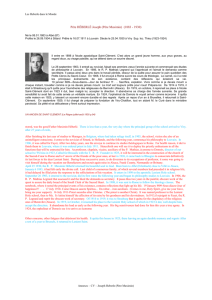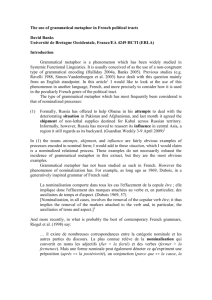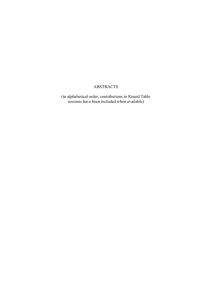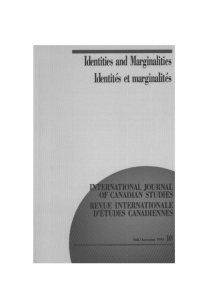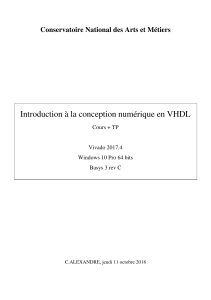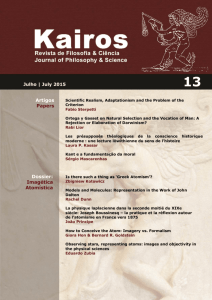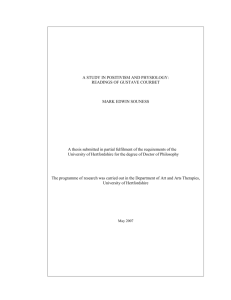Henry B. Veatch, Two logics : The Conflict between Classical
advertisement
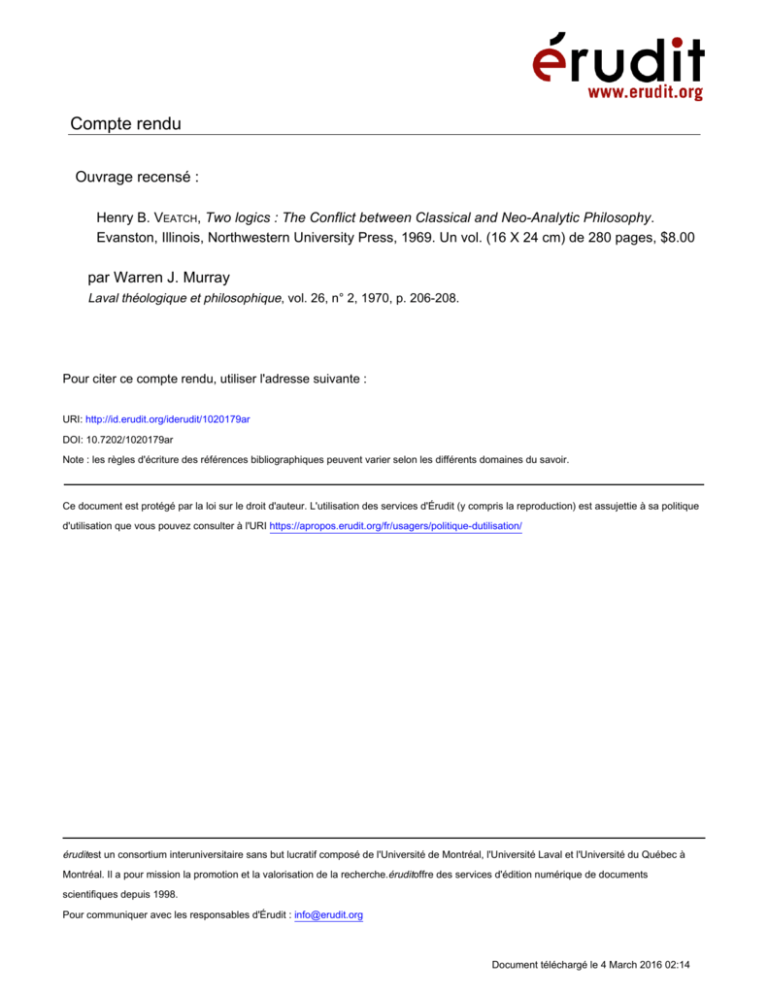
Compte rendu Ouvrage recensé : Henry B. VEATCH, Two logics : The Conflict between Classical and Neo-Analytic Philosophy. Evanston, Illinois, Northwestern University Press, 1969. Un vol. (16 X 24 cm) de 280 pages, $8.00 par Warren J. Murray Laval théologique et philosophique, vol. 26, n° 2, 1970, p. 206-208. Pour citer ce compte rendu, utiliser l'adresse suivante : URI: http://id.erudit.org/iderudit/1020179ar DOI: 10.7202/1020179ar Note : les règles d'écriture des références bibliographiques peuvent varier selon les différents domaines du savoir. Ce document est protégé par la loi sur le droit d'auteur. L'utilisation des services d'Érudit (y compris la reproduction) est assujettie à sa politique d'utilisation que vous pouvez consulter à l'URI https://apropos.erudit.org/fr/usagers/politique-dutilisation/ éruditest un consortium interuniversitaire sans but lucratif composé de l'Université de Montréal, l'Université Laval et l'Université du Québec à Montréal. Il a pour mission la promotion et la valorisation de la recherche.éruditoffre des services d'édition numérique de documents scientifiques depuis 1998. Pour communiquer avec les responsables d'Érudit : info@erudit.org Document téléchargé le 4 March 2016 02:14 COMPTES RENDUS Cet ouvrage facile d’accès exprime des vues d’un grand intérêt sur un problème contemporain de la pensée chrétienne. Il a de plus le mérite de tenir constamment le lecteur près des sources bibliques. les différents chapitres : Kant et l’argument ontologique ; Leibniz et la raison de l’exis­ tence ; l’Être nécessaire et la contingence du monde ; la possibilité et son fondement ; la théologie transcendentale ; la théologie na­ turelle et la science ; la finalité naturelle et la théologie physique ; la liberté et la théolo­ gie morale ; Dieu et la philosophie réflexive. « La philosophie ne prétend pas à la connaissance parfaite de l’essence divine . . . Ce qu’il lui appartient de montrer, c’est que l’idée de Dieu n’est pas un produit de l’ima­ gination ou de la coutume, qu’elle s’impose à la réflexion rationnelle ». Le Dieu des philosophes, selon S. Augustin, est conçu comme la cause de l’existence, la raison de l’intelligence et la règle de la conduite. Il s’agissait alors des platoniciens. Le rôle de la philosophie est modeste en ce qui regarde Dieu, mais il est plus que jamais nécessaire ; c’est d’attester que ce qu’on appelle « la mort de Dieu » n’est qu’un phénomène so­ cial indiquant qu’on ne veut plus parler de Dieu, mais entraînant aussi la mort de l’homme. A.-M. P a r e n t Colette D u b eau Henry B. V e a tc h , Two logics: The Con­ flict between Classical and Neo-Analytk Philosophy. Evanston, Illinois, North­ western University Press, 1969. Un vol. (16 X 24 cm) de 280 pages, $8.00. The title of Professor Henry Veatch’s newest book might lead the casual reader to the conclusion that the author’s sole intention was to examine the conflict between two schools of philosophy. In point of fact, how­ ever, a much more ambitious task is pro­ posed, which is no less than the confront­ ation of two radically different kinds of knowledge, each of which is inexorably tied to a particular type of method, or “logic” as Professor Veatch would have it. These kinds of knowledge are usually designated as scientific and humanistic ; and, as we have been told for some years now by no less imposing philosophical figures than Ortega y Gasset and C. P. Snow, they divide the intellectual world into two distinct cultures. Professor Veatch goes far beyond any vague re-hashing of the characteristics of these two cultures. His purpose is to show how they differ. He even makes so bold as to advance the thesis that what characterizes humanistic culture, as over against scientific culture, is the use of a what-logic. Hardly have the average reader’s shock and astonishment permitted him to continue his perusal when he realizes that the battle-lines have been drawn, and that he is about to become a spectator to a conflict not unlike that which pitted David against Goliath, or, perhaps better, Hercules against the hydra. The au­ thor undertakes the defense of the humanities in the name of their foremost discipline — traditional philosophy, proposing to show not only that traditional philosophy has a right to an autonomous existence, but that the type of knowledge which it obtains. Karl Hermann S c h e lk le , La Parole et l’Es­ prit. Traduit de l’allemand par Henri Rochais. Collection Méditations théolo­ giques, Paris, Desclée de Brouwer, 1969, (12.5 X 19.5 cm), 144 pages. L’A. traite de la Parole et de l'Esprit en deux parties bien distinctes ; mais les deux thèmes sont intimement liés, dans la pensée de l’A. Il ne peut y avoir Esprit du Christ sans Parole du Christ. Mais où peut-on reconnaître la Parole de Dieu ? L’Écriture — parole écrite — n’est pas la parole immédiate de Dieu, en ce sens qu’elle ne saurait constituer un appel direct et personnel adressé à chaque homme d’aujourd’hui. La Parole de Dieu découvre sa présence là où elle manifeste son efficacité, c’est-à-dire dans la prédication par l’intermé­ diaire de laquelle la Parole rejoint l’homme de chaque époque et de chaque milieu. Aussi la prédication ne serait-elle pas le moment de vérité de la théologie, comme le pense l’A. ? 206 COMPTES RENDUS But the bee takes a middle course. She gathers her material from the flowers o f the garden and the fields, but transforms and digests it by her own power. The true concern of philosophy is not unlike th is ; for it neither depends solely or principally on the powers of the mind, nor does it take the materials which it has gathered from natural history and mechanical experiment and store them up whole in the memory as it found them ; but rather lays them up in the understanding changed and digested. and subsequently permits for all the human­ ities, is prior in importance, more basic to us as men, than that prototype which is suggest­ ed by the experimental sciences, and of which neo-analytic philosophy gives us the most systematic explicitation. Professor Veatch is admirably equal to a task which few philosophers would dare undertake today, so that even if one is obliged to admit that some of the hydra’s heads remain, our modern-day Hercules has left no doubt that the beast will never be quite the same again. The author has a good knowledge of neo-analytic philosophy, and his attacks are almost always to the point. He avoids the pitfalls of vacuous style and dry pedantry. As a result, the book is as full of wit and charm as it is of concision and truly rigourous logic. The central proposition of the book is that knowledge in the humanities is obtained through the use of a logic which seeks the “whats” or essences of things ; whereas the knowledge obtained in the experimental sciences is one that is mediated by a logic whose concern is exclusively with relations or structures, and not at all with what things really are. Borrowing from Jonathan Swift’s famous Battle of the Books, he characterizes the first sort of logic as a bee-logic, and the second as a spider-logic. Such a comparison may be very useful, and is certainly amusing, especially as seen through the satire of a Swift. It would seem better, at first glance, to have referred the reader back to the original source of this comparison of bee and spider which, although considerably dryer in style than the version of the great satirist, would no doubt have made it more palatable to those readers of a scientific bent. This version is, of course, the one which Bacon gives in the Novum organum, no. xcv, wherein, by one of the most beautiful similes in philosophical litterature, is ex­ pounded what the author believes to be the true attitude of the philosopher towards knowledge. Bacon’s version brings in an empirical ant as well, and the context makes it evident that by philosophy he means the experiment­ al sciences. Swift’s version has no need of the a n t; nor, for that matter, does that of Professor Veatch, both of whom wish to oppose the humanist bee to the modern (analyst) spider. A careful reading of Swift’s narrative shows several reasons why the author of Two Logics might be more in sympathy with the modified comparison of dean Swift than with the original baconian form. What is at stake here is not just the comparison of bee and spider, of traditional humanist and modem analyst, but also the very conditions of the battle to be fought. On whose territory is the war to be waged ? Swift answers : “ ‘Sirrah’, replied the spider, ‘if it were not for breaking an old custom in our family, never to stir abroad against an enemy, I should come to teach you better manners’.” And again, if one wishes to know what sort of battle will be generally carried on by our spider, Swift leaves no d o u b t: At this the spider, having swelled him­ self into the size and posture of a dis­ putant, began his argument in the true spirit of controversy, with a resolution to be heartily scurrilous and angry, to urge on his own reasons, without the least regard to the answers or objections of his opposite, and fully predetermined in his mind against all conviction. Thus, in full knowledge of the general nature of the antagonists, and of the sort of skirmish to be expected, Professor Veatch charges into battle, forcing us to drop the happy similitude of Hercules and the hydra in order to adopt the even happier one of the bee and the spider. Those who have been concerned with the sciences have been either empiricists or rationalists. The empiricists are like the a n t; they only collect and u s e ; the relationalists are like the spider, who makes webs out of his own substance. 207 COMPTES RENDUS The bee’s first task is to defend the unique value of what-statements (the honey and wax which is brought home, as Swift says, “by a universal range, with long search, much study, true judgment, and distinctions of things”). This he does admirably well by successive confrontations between what-statements and both synthetic and analytic truths, the which now appear frighteningly similar to the spider edifice of which Swift says “it will conclude at last in a cobweb, the duration of which, like that of other spiders’ webs, may be imputed to their being forgot­ ten, or neglected, or hid in a corner”. tween the two logics. Professor Veatch puts it this way : In short, the proposition is this : Recog­ nize a difference between the two logics and abide by i t ; it should then be possible to accord a proper status to both that substantive knowledge which we have of ourselves and of the everyday reality of the world and that calculative knowledge which in the sciences enables us so successfully to keep going on from phenomenon to phenomenon (p. 265). Certainly some complementarity would seem to be in order. The problem here is that Professor Veatch has so sucessfully shown the limitations of a relating-logic that one is perhaps justified in wondering whether this complementarity can be quite what he now makes it out to be ; for, if what he has shown is true, then it must be admitted that a what-logic is not only necessary for the humanities, but also, in some way, for the experimental sciences ; and that this whatlogic must preceed a relating-logic in these same sciences. After all, was not Bacon proposing a bee-like activity for the scientist ? Moreover, has not a real contact with ex­ perience always been the distinguishing mark of the experimental sciences as compared to other disciplines of an almost pure spider nature ? And, does not this necessarily bee­ like activity of the scientist require him to make use of a conceptual, rather than a relating logic ? Perhaps more care should be taken before identifying the total method or logic of the sciences with that proposed by various schools of neo-analytic philoso­ phy. In this respect more attention might be paid to the scientist than to the philoso­ pher who claims to have the same method, but whose criteria of judgment fall far short of those demanded by this method as it is practiced in the sciences. Whatever might be one’s opinion on the question raised by Professor Veatch, it is difficult not to find this book immensely in­ teresting and highly stimulating. It certainly merits as one of the most important con­ tributions to the debate between the human­ ities and the sciences to have appeared in recent years ; in brief, a highly provocative book, an one not to be missed. This assault is followed by some daring forays into various well-defended enclaves of relating-logic, during which, perhaps because he is in enemy territory, the bee seems to come off better in his attacks than in his defenses. This is particularily true of the considerations on intentionality, on induc­ tion, on the grammatical form versus the logical form, and on the nature of the predicables, in regard to which items many a bee will certainly accuse their brave defend­ er of having perhaps a few too many spider webs in his own hive. In the final phases of the confrontation the bee descends once more from the cold and near-airless heights of logic, and pro­ vides his spectators with some concrete evidence of the value and necessity of a what-logic. This evidence he draws from history and ethics, those two disciplines which are, perhaps, the most intimately tied to our concrete human existence. In this way he makes full course and returns to those issues which provoked the whole conflict. At this point the reader, fully expect­ ing the bee to give the almost lifeless spider the coup de grâce, is perhaps somewhat taken back by what appears to be an act o f almost pure magnanimity. In the con­ clusion of the book it is suggested that a modus vivendi ought to be found between the two. Relating logic does, after all, allow us to “go on”, even if it cannot tell us what those things are between which the various symbolic relations are established. Thus, a certain complementarity is to be found be­ Warren J. M u rra y 208
